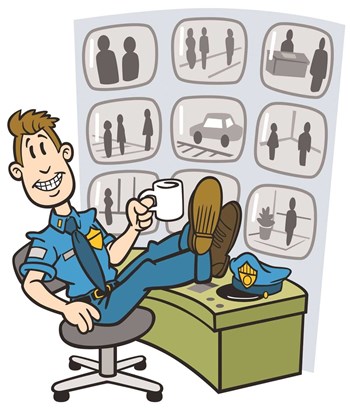
There are many different factors that potential condominium owners contemplate when looking to buy a unit. Aesthetics, price, and location are important, for sure. But perhaps the most critical factor of all is the safety of the building and the neighborhood it’s in.
Whether we want to admit it or not, crime is all around us in today’s society. To counteract that situation, condominium associations and boards of trustees are implementing surveillance on their properties. Associations often install cameras in an effort to keep a watch on their locations in a visible way that gives residents a sense of security. Unit owners can expect to see those ubiquitous cameras in hallways, in garages or parking areas, near elevators, and at common areas like pools, tennis courts, or other amenities.
Do Cameras Really Provide Security?
Cameras, however, are, at heart, just mechanical eyes. When it comes to security, their prime purpose is to record happenings in an environment for use later by condominium boards, trustees, and hired security staff if a problem is reported.
That’s the catch. Whether or not there are security stations and guards on a property, it’s rare that someone is sitting there watching the surveillance video feed 24 hours a day, seven days a week. That’s why attorney Henry Goodman of Goodman, Shapiro & Lombardi LLP in Dedham, Massachusetts, cautions condominium owners that having cameras on site doesn’t mean that the environment is safer than if they were absent.
“When condominium associations put in so-called security and they notify the unit owners that there are security cameras or guards, a lot of people have a false understanding of what that means,” Goodman says. “[Owners] think that they are more secure and feel as if there is greater protection. In fact, security cameras do not provide security. All they do is record things.”
So the questions remain: Does having numerous cameras around actually make a difference? Do management companies find that properties with a greater security presence experience a drop in the crime rate?
The short answer: yes. If unit owners and visitors see cameras around the property, then there is the immediate curiosity as to whether there is someone, somewhere, monitoring the feed. But small condominium associations, beware. If you’re going to put cameras in place and provide residents with that comforting feeling of security—then it is your duty to maintain those cameras with reasonable care.
“Some small associations don't have the resources or a lot of money to maintain these cameras or personnel to review them and so on,” says attorney Howard Goldman of Goldman & Pease LLC in Needham, Massachusetts. “With that said there is some deterrence to have at least the appearance of cameras. However, if something goes wrong the association becomes more liable. They embarked on an obligation they may have not had before to have cameras and do it poorly; that’s negligence.”
Condominiums are not required to have cameras on site. However, if the community is in an area of high crime, then there may be an expectation for security. Management should want to know what’s going on so they can put a halt to any mischief. Plain and simple: Residents don’t want to live in a high-crime area, and managers want people to occupy their homes in peace.
“Maybe you get a pass on the first crime that takes place, maybe you get a pass on the second crime that takes place,” says attorney Stephen Marcus, of the Braintree, Massachusetts law firm of Marcus, Errico, Emmer & Brooks, P.C. “However, I believe there could be cases where there could be liability for an association knowing that there is a potential risk of crime and they did not have surveillance cameras. “
Where You’re Being Watched
Condominium owners have an expectation of privacy. That means that when you’re inside the comfort of your own home, you don’t expect anyone to be breathing down your neck or unwelcomed visitors to invade your space.
That leads to restrictions as to where cameras can and cannot be placed. Marcus says that in common areas, owners shouldn’t have an expectation of privacy because they’re actively navigating a public space. But inside? “Once you’re in your unit, that should be sacred and off limits,” he says.
So where are some of the places that management or security companies most definitely want to make sure your property has surveillance? Douglas Thayer, CPM, president of Thayer & Associates Inc. in Cambridge, Massachusetts, cites the areas in and around elevators as prime spots. If one individual inside the elevator approaches another resident or visitor and some sort of altercation happens, having cameras in the area can offer a great opportunity to place liability in the incident.
“One of the great opportunities for people to file claims is in elevators,” said Thayer. “If you have surveillance, you can prove if what they’re claiming is true or not. I think there is a real self-interest in having security cameras installed in and around elevators.”
Other Popular Measures
When evaluating condominium security, look beyond the camera. In many of today’s neighborhoods, boards are issuing key cards and key fobs. These devices monitor when residents are coming in and out of an area. Another benefit: if something were to happen— say an owner was to lose his or her access card or the management company had to restrict that person’s access—all the manager has to do is go into the computer system and deactivate that unique card or fob. These developments in technology make everything much easier for managers and unit owners alike, because no one has to keep track of keys.
And, Thayer notes, “If a problem arises, you can go back and see who went into the garage in a block of time, so you might find witnesses to an incident.”
Potential condominium buyers might also want to inquire if there is a security team monitoring the footage. If there is a security team, there is a higher possibility that action can be taken immediately upon an incident or soon thereafter. Some properties may not have security staff on site, but are able to be monitored by staff in different towns, or even different states.
“Today, some of the systems are accessible through the web,” said Thayer. “If we're at our management office in Cambridge and we have a problem at our property in Milford, Massachusetts, for example, you can log in and monitor any of the cameras they have through the web if they have the technology installed.”
Because of privacy issues, only authorized personnel like managers or security staff can access to these systems and records unless there is an incident that needs police intervention. Needless to say, your neighbor won’t have the chance to check out what you wore last Thursday on a security feed just because they “feel like it.”
Unit owners may want to inquire how long the records are kept, in order to be aware of the time frame for reporting an incident. Suggestions differ as to how long condominium associations should keep their security footage. While certain management companies may only hold onto the footage and images for 24 to 48 hours, others may keep it for almost six months. James Cook, sales director at American Alarm and Communications Inc. in Arlington, Massachusetts, suggests a minimum of 30 days.
“If I’m a property owner and an event happens and someone is trying to bring litigation against me, they really aren’t going to go back two or three months and say something like ‘Oh, I fell down back in May.’”
However, there are restrictions as to how long the footage can be kept on file placed on the association because of cost and storage space. Some systems, for example, may have a tape that can hold 24 hours of footage and then it automatically kicks back, recording over the previous day’s footage at the start of each new day. That means associations would only have a 24-hour window to review footage in the wake of an incident.
The good news is that for many of today’s cameras, the footage is recorded digitally and available online. “[Today we're] moving away from analog cameras and moving toward digital cameras. It’s a better image, of course, they’re more expensive,” says John Eastwood, vice president of Metroguard Security Services, Inc. in Fairfield, Connecticut. They’re also more sensitive when it comes to motion detection, he explains. “Some of the newer cameras are smart enough to tell the difference between a dog and a cat and a human being.”
That online availability and image storage could make security records available for longer than a straight tape feed. However, keeping that imagery requires server space and that server space can be very expensive. In most cases, condominium associations are only fronting the money to increase storage space if they have a good reason. “It’s sort of a mixed bag; no one wants to spend a dime, especially in this economy,” Eastwood notes.
Don’t Be a Dummy
One of the hottest topics in security today is the use of dummy cameras—faux cameras that are placed onto the property in an effort to deter crime. Legal professionals and managers alike express concerns about the risk that these devices provide.
“Dummy cameras are a bad, bad idea,” Thayer says. “You create a false impression of security that’s not there, something happens, and then you may as well just open your checkbook and write a check.”
Even scarier is a scenario in which a criminal figures out that a camera in the corner of a parking lot is fake. That gives the person free rein of the surrounding area. Unit owners could see their cars, bikes, tires, and other property disappear overnight—all because of a false attempt to provide “security.”
But while real cameras and other technology may make even honest citizens feel a bit nervous, security measures—in increasing dosage—are here to stay.
“At the very least, we must be discouraging those who want to commit mischief by having surveillance,” Thayer says.
Emile Abbate is a freelance writer and a frequent contributor to New England Condominium.






Leave a Comment